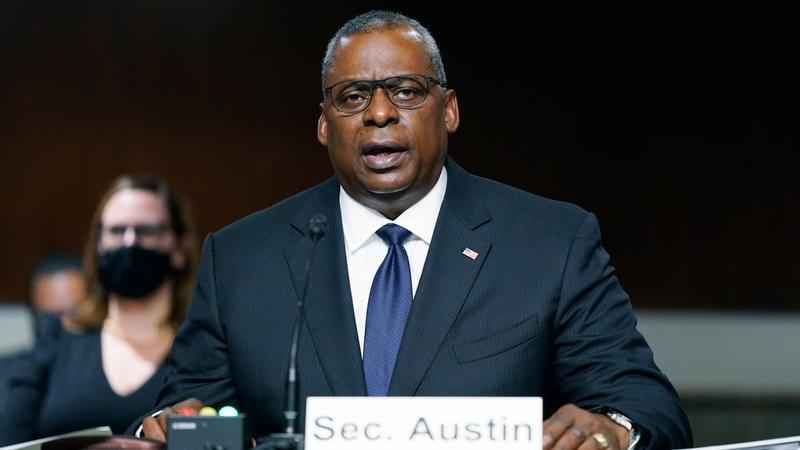Pentagon chief defends execution of final airlift from Kabul

Defense Secretary Lloyd Austin speaks during a Senate Armed Services Committee hearing on the conclusion of military operations in Afghanistan and plans for future counterterrorism operations, Tuesday, Sept. 28, 2021, on Capitol Hill in Washington. [AP Photo/Patrick Semansky, Pool]
In his first congressional testimony on the tumultuous U.S. withdrawal from Afghanistan, Defense Secretary Lloyd Austin on Tuesday defended the military’s execution of a frantic airlift from Kabul and asserted it will be "difficult but absolutely possible" to contain future threats from Afghanistan without troops on the ground.
Speaking alongside Gen. Mark Milley, chairman of the Joint Chiefs of Staff, Austin also questioned decisions made over the 20-year course of the U.S. war in Afghanistan. In retrospect, he said, the American government may have put too much faith in its ability to build a viable Afghan government.
"We helped build a state, but we could not forge a nation," he told the Senate Armed Services Committee. "The fact that the Afghan army we and our partners trained simply melted away – in many cases without firing a shot – took us all by surprise. It would be dishonest to claim otherwise."
Austin acknowledged shortcomings in the final airlift from Hamid Karzai International Airport that began Aug. 14, such as an initial wave of violence at and near the airfield that led to multiple deaths of Afghan civilians. But he asserted that the airlift was a historic accomplishment that removed 124,000 people from Taliban rule.
"To be clear, those first two days were difficult," said Austin, who is a veteran of the war. "We all watched with alarm the images of Afghans rushing the runway and our aircraft. We all remember the scenes of confusion outside the airport. But within 48 hours, our troops restored order, and process began to take hold."
The Biden administration faces criticism on multiple fronts for its handling of the final months of the war.
Sen. James Inhofe, the ranking Republican on the Armed Services panel, told Austin and Milley that the withdrawal and evacuation amounted to an "avoidable disaster."
Republicans in particular have intensified their attacks on President Joe Biden’s decision to pull all troops out of Afghanistan by Aug. 30, saying it left the U.S. more vulnerable to terrorism. They are demanding more details on the suicide bombing in Kabul that killed 13 American service members in the final days of the withdrawal.
Gen. Frank McKenzie, who as head of Central Command oversaw the withdrawal, testified alongside Austin and Milley.
Inhofe has peppered the Pentagon with a lengthy list of questions about multiple aspects of the withdrawal, including the suicide bombing on Aug. 26 at Kabul’s international airport that killed some 169 Afghans in addition to the American service members. He also is demanding information about decision making over the summer as it became apparent that the Taliban were overwhelming U.S.-backed Afghan forces.
"We need a full accounting of every factor and decision that led us to where we are today and a real plan for defending America moving forward," Inhofe wrote last week.
The withdrawal ended the longest war in U.S. history. The Biden administration, and some Democrats in Congress, have argued that former President Donald Trump bears some of the blame for the war ending in a Taliban victory, since his administration signed a deal with the Taliban in 2020 that promised a full American withdrawal by May 2021. They also have pointed to a yearslong U.S. failure to build an Afghan military that could stand up to the Taliban.
"This is not a Democratic or a Republican problem. These failures have been manifesting over four presidential administrations of both political parties," Sen. Jack Reed, D-R.I, said the day after the Taliban took over Kabul on Aug. 15.
Although Tuesday’s hearing was scheduled to focus on Afghanistan, other topics were sure to come up, including Milley’s actions during the final months of Trump’s presidency.
Some in Congress have accused Milley of disloyalty for what the book "Peril," by Bob Woodward and Robert Costa, reported as assurances to a Chinese general that the U.S. had no plan to attack China, and that if it did, Milley would warn him in advance. In the days following news accounts of the book’s reporting, Milley declined to comment in detail, instead telling reporters that he would lay out his answers directly to Congress. His only comments have been that the calls with the Chinese were routine and within the duties and responsibilities of his job.
Both Milley and Austin have defended the U.S. military’s execution of an Afghanistan withdrawal that Biden ordered in April. The pullout was largely completed by early July, but several hundred troops were kept in Kabul, along with some defensive equipment, to protect a U.S. diplomatic presence in the capital. The State Department initially said the diplomats would remain after the military withdrawal was completed by Aug. 31, but when the Afghan forces collapsed and President Ashraf Ghani fled the country, leaving the Taliban in charge, a frantic evacuation began.
The Pentagon has defended its execution of an airlift from Kabul airport that transported more than 120,000 people, while acknowledging that it got off to a chaotic start and was under near-constant threat of terrorist attack.
"The Biden administration’s avalanche of incompetence has damaged our international reputation and humiliated the United States on the world stage," Sen. Tom Cotton of Arkansas and Rep. Mariannette Miller-Meeks of Iowa, both Republicans, wrote in the Des Moines Register. "Yet, our president and secretary of state continue to pretend that the withdrawal from Afghanistan was a historic success."
Cotton and others have questioned the viability of U.S. plans to contain al-Qaida and the Islamic State group’s Afghanistan affiliate by using intelligence-collection assets and attack planes based outside of Afghanistan.